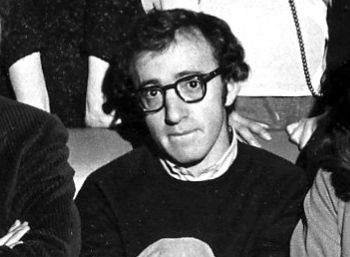Civilization
Gatsby Loses to Woody Allen

Welcome to the Roaring Twenties. Of course, it’s too early to know whether the roar is college revolt or the howl from high food prices. Two years ago, F. Scott Fitzgerald’s masterpiece of the prior Roaring Twenties, The Great Gatsby, entered the public domain and on April 25th a Broadway musical version opened on the Great White Way. The timing is exquisite, since we are living in an era where billionaires fascinate, and populists propose to confiscate their wealth. Fitzgerald’s flawed, all-American tycoon earned his stash of illicit loot trading shady corporate bonds, and with his champagne flutes and flapper-filled parties on Long Island, Gatsby sure looks like a poster-child for the lucky and sometimes boorish “1 percent.”
Gatsby takes the easy out
Downtown, Woody Allen’s new movie, Coup de chance, is playing. The movie boasts a French title, French dialogue, and French scenery because Mr. Allen has mostly been cancelled in the U.S., the result of 1992 child abuse allegations. But is it possible that Woody Allen, a former gag-writer turned auteur, has a savvier take on wealth and American success than the worshiped Fitzgerald?
Not long ago while in Paris, I re-read Gatsby. On my flight back to New York, I watched Woody Allen’s 2011 Midnight in Paris, his Oscar-winning work that portrays F. Scott Fitzgerald on screen. And then I hit the replay button and watched it again. I’ve never done that before, neither for Kurosawa’s Seven Samurai nor for Rocky IV. Both Gatsby and Midnight in Paris offer pointed lessons about today’s socio-economic plight. But I have to confess: Woody Allen’s work has more to teach us than F. Scott Fitzgerald. Between these two, who is the cynic and who is the realist? Who sees demons where they don’t belong, and who holds out hope? I was surprised to find that Woody Allen – who’s been cracking mother-in-law jokes since the 1950s – does not take the easy way out. Fitzgerald does.
Fitzgerald was the star of a decade that ended badly
Yes, I know, Jay Gatsby tops Book magazine’s poll of literary experts as the greatest character in twentieth century American literature, and no kid can squeeze past school without at least buying Fitzgerald Sparknotes or Shmoop. Fitzgerald is literature. Heck, Harold Bloom, America’s most heralded Shakespeare scholar, published his notes on Gatsby. Meanwhile Woody Allen is an NYU dropout who started by writing jokes for Sid Caesar’s television show and starred in a movie in which he kidnaps a nose (Sleeper). But that’s the point: both Gatsby and Midnight in Paris are quintessentially American: in both a hero tries to remake himself while shrugging off the costume that others want him to wear.
Fitzgerald was the literary star of the Roaring Twenties, a decade that didn’t turn out so well. In his 1925 novel, crass and thoughtless Daisy Buchanan crashes her car into a pedestrian, wrecking the lives of blameless bystanders. “They were careless people…they smashed up things and creatures and then retreated back into their money,” Fitzgerald charges. Four years later in 1929 – in real life – a financial market driven by slick stock traders careened out of control, crushing innocent victims, and steering a million of them into soup lines across America. Pretty prescient, that “old sport” Fitzgerald.
Compare Fitzgerald to his real-life naive guest
But let’s start by comparing Fitzgerald himself to Gil Pender, played in the film by Owen Wilson. Pender hops into a chauffeured yellow car (like Gatsby’s) with Scott and Zelda Fitzgerald, who are already pouring cocktails. They sweep Gil into a bubbly party where Cole Porter croons his own tunes at the piano. What a swell party this is!
In real life, Fitzgerald was an insecure writer, worried about his paycheck and his penis size. After selling some books he fled to Hollywood to write screenplays, becoming one of the fellas that Jack Warner was referring to when he called screenwriters “schmucks with Underwoods.” Fitzgerald cashed the studio paychecks and apparently blew the loot on gin. Gil Pender takes the opposite route. He’s already lapped up Hollywood success, written a bunch of lucrative but critically crappy movies, and hopes finally to write something worthy—a literary novel. In his words, “I’m a Hollywood hack who never gave real literature a shot.” He probably has a shelf full of Sparknotes, for he admits “I failed freshman English.”
The Gatsby mistake
In Midnight in Paris, we see the story through Gil’s eyes, while in Gatsby we witness the display through Nick Carraway, an all-around good guy from the Midwest who chronicles the climbers and the upper-crust, all culpable in their disregard for the servants and the little people. The women seem especially bad, as Daisy acquires the “voice of money.” Likewise, Gil’s materialistic fiancée Inez accuses Gil of always taking “the side of the help. That’s why Daddy says you’re a communist.”
But here’s the mistake of Nick and Fitzgerald himself. They take the easy way out and blame the City and modernity. If only Nick and Gatsby had stayed in the wholesome West; if only Gatsby had stayed in North Dakota, no car would’ve crashed, and no champagne would have corrupted common folk and twisted them into the despicable nouveaux riches. Nick states that he’s “one of the few honest people that I have ever known,” and realizes that “this has been a story about the West,” not the East.
It’s a story of innocents perverted by the big City, the jazz music, the highball cocktails and the cosmopolitan high life. It doesn’t hurt this theme for Fitzgerald to throw in city-slicker, baseball-game-fixer, Meyer Wolfsheim, whose cufflinks are made from human molars. He’s Bernie Madoff without the good diction. In Gatsby, everyone would’ve have been better off if they had stayed out west, milking cows or shearing sheep in the barn.
Noble savage fantasy redux
This sounds like the same noble savage fantasy that’s made the rounds of literature ever since Jean Jacques Rousseau. The jungle and the farm are noble. The city and “civilization” are corrupting. Contrast Tarzan with Dorian Gray. In Tarzan, immoral Londoners deceive the innocent ape-man, who knows more about honesty and decency than they. In The Picture of Dorian Gray, the urban and urbane Dorian is a selfish, immoral monster. Clearly, he’d spent too much time in the civilized world and not enough time swinging from the trees in the jungle.
These depictions are fantasies, not just because they are written by fiction writers. They are fantasies because crime rates are lower among city-dwellers than among primitives. Murder rates in Europe today are about one-tenth as high as in 1300 AD, when just about everyone lived on the farm. As societies have become more focused on trade and commerce, they have become less violent, not more. In ancient burial grounds for primitive people, between 20-50 percent of the skeletons appear to have been bludgeoned to death. Unfortunately, Fitzgerald’s The Great Gatsby falls into the same fantasy camp as Tarzan of the Apes.
Woody the realist
Midnight in Paris takes a different tack, a more sophisticated and truer route to understanding good and evil. At first, when Gil goes back in time to the 1920s, Cole Porter does harken back to the purity of rural life. He sings of the young farmers who “desert the farm.” (Coincidentally, the song comes from a 1929 show called Fifty Million Frenchmen.) And Gil does yearn for a simpler life than one plagued by Los Angeles freeway traffic, know-nothing movie producers, and dropped cell-phone calls. He’s a lost soul in 2011 and would rather retreat with the “Lost Generation” of Fitzgerald, Hemingway, and Gertude Stein. When writers wrote in longhand or pecked away on typewriters that made a clickety-clack sound.
But as the film progresses, Gil learns that his nostalgic yearning for a simpler time is both common and ultimately pointless. While pining for the Lost Generation in the parlor of Gertrude Stein, he falls for a girl who assures him that “I’m from the 1920s, and I’m telling you the golden age is La Belle Époque,” not the 1920s. Then they magically ride by carriage to a restaurant where Toulouse-Lautrec and Degas are dabbing at their palettes. These Belle Époque artists yearn for an even earlier époque.
The Golden Age of Gatsby never existed
Finally, Gil realizes that there is no golden age, that we’re imperfect people anywhere we live. Those simpler days in the past may not have been so blissful after all. He concludes that the present is “a little unsatisfying because life is unsatisfying.” Better to live in the present with Novocain, antibiotics, and iPhones than to have your teeth pulled without anesthesia or to place a telephone call by tying two cans together with string.
While progressives and socialists slam the rich and denounce neoliberalism, very few of them seem to be willing to give up their cell phones and all the other good things in modern life brought to you by the hard-driving strivers. In 1896, when Fitzgerald was born, life expectancy was just 47 years of age. Life was simpler but more deadly. Parents didn’t worry about snooping Facebook friends; they worried that their children were dying of cholera. Woody Allen once wrote a facetious commencement speech offering just two stark paths for humanity: “One leads to despair and utter hopelessness. The other, to total extinction. Let us pray we have the wisdom to choose correctly.” Most of human history has been marked by despair, hopelessness and near extinction. Whether by wisdom or sheer luck, we somehow tripped upon a third way, just about the time that F. Scott Fitzgerald was giving up on America.
This article was originally published by RealClearBooks and made available via RealClearWire.
Todd G. Buchholz, a former White House director of economic policy and managing director of the Tiger hedge fund, served as a fellow at Cambridge University, and is the author of The Price of Prosperity and the novel, The Castro Gene. He is co-writer of the new musical Glory Ride, which enjoyed a successful run in London’s West End in 2023.
-

 Civilization1 day ago
Civilization1 day agoWhy Europe Shouldn’t Be Upset at Trump’s Venezuelan Actions
-

 Accountability4 days ago
Accountability4 days agoWaste of the Day: Principal Bought Lobster with School Funds
-

 Executive2 days ago
Executive2 days agoHow Relaxed COVID-Era Rules Fueled Minnesota’s Biggest Scam
-

 Constitution3 days ago
Constitution3 days agoTrump, Canada, and the Constitutional Problem Beneath the Bridge
-

 Christianity Today1 day ago
Christianity Today1 day agoSurprising Revival: Gen Z Men & Highly Educated Lead Return to Religion
-

 Civilization2 days ago
Civilization2 days agoThe End of Purple States and Competitive Districts
-

 Executive2 days ago
Executive2 days agoWaste of the Day: Can You Hear Me Now?
-

 Civilization5 days ago
Civilization5 days agoThe Conundrum of President Donald J. Trump














